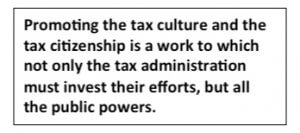Transparency and promoting the tax culture
 If we share the affirmation of Judge O. Wendell Holmes that “taxes are the price that you have to pay to live in a civilized society“, we must not forget an important element: those who pay taxes.
If we share the affirmation of Judge O. Wendell Holmes that “taxes are the price that you have to pay to live in a civilized society“, we must not forget an important element: those who pay taxes.
The goal of this brief intervention is not to abound in the role of the tax administration in the citizens’ perception about the reliability and integrity of their governments, but to analyze some of the actions that a tax administration may carry out to promote compliance with tax obligations.
We are all agree that the duty to contribute to the sustainability of public policies goes beyond a legal obligation, enshrined in many constitutional texts, to become a social duty of solidarity. In this context, I consider necessary to ignore notions trying to justify the fraud by the mismanagement of the public service or those that demonize the taxpayer as a criminal in power.
Apart from the initiatives, tools and strategies of coactive-corrective type that tax administrations design and carry out in the aim to increase control and reduce fraud and evasion, I would like to highlight some actions which impact specifically the citizen’s perceptions and that are aimed at promoting a tax culture. I am referring to accountability and transparency.
The so fashionable “accountability” word in the public sphere serves to prevent and correct abuses of power, compel authorities to be open to inspection and to explain and justify their actions. The aim is to promote trust and a transparent “public thing“, giving the citizens of tools and data to evaluate the performance of their administrations. The IMF itself points out that “fiscal transparency is a critical element of management and accountability“.
The new technologies have changed the paradigm of transparency and the network has left obsolete the old mechanisms and formats of accountability. Tax administrations are not alien to these changes and have been rapidly incorporating them. Currently all have websites with complete and accurate information about their activities, mission, vision, structure and organization chart, legal regulatory framework, services to the taxpayer, query mailboxes, reports, policies and strategies, budgets and many other functions that has approached them from the citizens.
A remarkable international initiative that advocates for Global Initiative for Fiscal Transparency (GIFT), a global network that facilitates dialogue between Governments, organizations of the civil society, private sector and other stakeholders to find solutions to the challenges in fiscal transparency and citizen participation. Particularly relevant is the adoption of the document “High-level principles of participation, accountability and fiscal transparency“, which highlights the importance of having access to quality information, constructive participation, transparency, and accountability to enhance the integrity and quality of tax policies, promote willingness to pay taxes, and increase the legitimacy and confidence in Government.
 But if the transparency is relevant in relation to the tax administration that gives accounts of its activity (how much and how it collects revenue), it is also important for citizens to know how much and what is spent, this is: make the public spending transparent. In this sense, all the initiatives undertaken by public authorities in order to make transparent the use of revenue, detailing concepts and items, are very laudable in promoting tax culture. We must not lose sight that the tax administration has an important role, but not exclusive, when it comes to promoting a behavior of compliance by taxpayers. To promote tax culture and tax citizenship is a work to which not only the tax administrations but all public authorities should devote efforts.
But if the transparency is relevant in relation to the tax administration that gives accounts of its activity (how much and how it collects revenue), it is also important for citizens to know how much and what is spent, this is: make the public spending transparent. In this sense, all the initiatives undertaken by public authorities in order to make transparent the use of revenue, detailing concepts and items, are very laudable in promoting tax culture. We must not lose sight that the tax administration has an important role, but not exclusive, when it comes to promoting a behavior of compliance by taxpayers. To promote tax culture and tax citizenship is a work to which not only the tax administrations but all public authorities should devote efforts.
“Every citizen has a right, either by himself or his representative, to a free voice in determining the necessity of public contributions, the appropriation of them, and their amount, mode of assessment, and duration“
Article XIV, Declaration of the rights of man and of the citizen (1789)
1,998 total views, 1 views today
